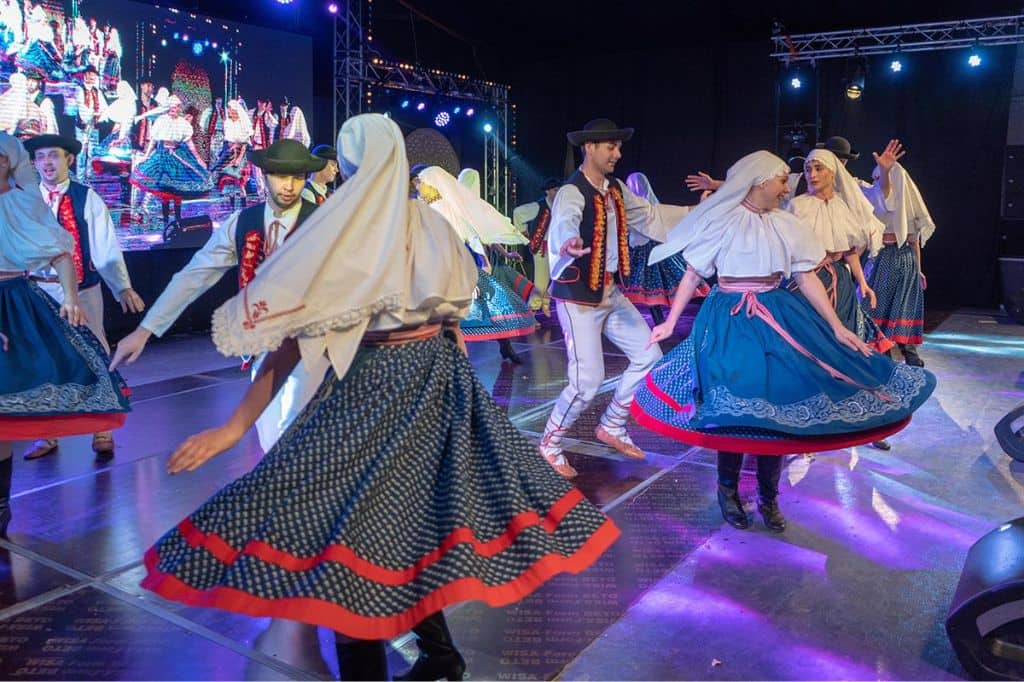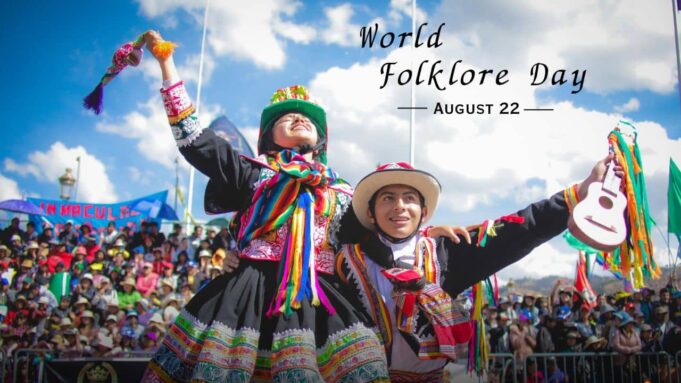Folklore Day, celebrated on August 22, honors the rich traditions of oral stories, music, dance, and crafts that shape cultural identities worldwide. Established globally after William John Thoms coined “folklore” in 1846, this day highlights folktales like Brazil’s Saci and Ghana’s Anansi, reflecting indigenous, African, and European influences.
From Brazil’s 1965 decree to UNESCO’s 2003 safeguarding efforts, Folklore Day promotes cultural preservation through festivals, storytelling, and art. It connects communities, from rural villages to urban neighborhoods, celebrating shared heritage. In this article, I will share Folklore Day’s history, celebration ideas, activities, quotes, wishes, fun facts, and answers to common questions for a vibrant August 22.
When Is Folklore Day 2025?
World Folklore Day 2025 is celebrated on August 22, a Friday. This summer date is ideal for hosting storytelling sessions, cultural festivals, or online events that honor global folktales and traditions. The timing suits community gatherings or sharing oral stories with family and friends.
What Is the History of Folklore Day?
Folklore Day, celebrated on August 22, began when William John Thoms coined the term “folklore” in 1846 in an “Atheneum” article, defining it as traditional knowledge of a people. Brazil established its Dia do Folclore in 1965 through a decree by Humberto de Alencar Castello Branco, emphasizing cultural preservation in education. The 1988 Brazilian Constitution (Articles 215, 216) enshrined folklore’s importance.
The 19th-century Grimm Brothers’ fairy tale collections sparked academic folklore studies, while UNESCO’s 2003 Convention for Safeguarding Intangible Cultural Heritage globalized preservation efforts. Today, countries like Ghana and Brazil celebrate with festivals, reflecting folklore’s role in cultural identity.
Related: National Acadian Day
How Can You Celebrate Folklore Day 2025?
Celebrating Folklore Day 2025 on August 22 is a vibrant way to honor cultural traditions. Here are engaging ways to participate:
- Attend folklore festivals or storytelling events featuring oral stories and traditional dances.
- Read or share folktales, like Brazil’s Saci or Ghana’s Anansi, with family or friends.
- Host a cultural workshop teaching traditional crafts or recipes tied to folklore.
- Share folklore stories or crafts on social media with #FolkloreDay.
- Explore modern folklore, like urban legends or internet memes, to connect past and present.
These ideas celebrate the storytelling and cultural heritage that define communities worldwide.
What Are the Best Activities for Folklore Day?

Make Folklore Day 2025 memorable with these activities celebrating cultural traditions:
- Host storytelling sessions with folktales from cultures like Brazil, Ghana, or Europe.
- Create folk art or crafts, such as Brazilian embroidery or Ghanaian kente cloth designs.
- Organize a virtual folklore event, sharing oral stories via video calls or social media.
- Cook traditional recipes tied to folklore, like Brazilian feijoada or Ghanaian jollof rice.
- Visit cultural museums or festivals, such as the Smithsonian Folklife Festival, to experience global traditions.
These activities encourage creativity, community engagement, and appreciation for folklore’s diverse stories.
Read More: National Sisters Day
What Are Some Folklore-Inspired Quotes for Folklore Day?
Here are five shareable quotes to celebrate Folklore Day’s cultural storytelling:
- “Folktales weave the past into the present, uniting us on August 22.” – Folklorist Maria Almeida
- “Folklore Day celebrates the oral stories that shape our cultural identity.” – Storyteller Kwame Osei
- “Through folklore, we preserve the wisdom of our ancestors.” – Cultural Historian Lena Santos
- “Every folktale told on August 22 keeps traditions alive.” – Brazilian Educator Ana Costa
- “Folklore’s stories and crafts connect communities across the globe.” – UNESCO Cultural Advisor
These quotes capture folklore’s role in preserving cultural traditions, ideal for social media or events.
What Are Folklore Day Wishes?
Spread the joy of Folklore Day 2025 with these heartfelt wishes:
- Wishing you a vibrant August 22nd filled with folktales and cultural traditions!
- May your Folklore Day be rich with oral stories and community spirit!
- Cheers to a memorable August 22, celebrating folklore’s timeless wisdom!
- Happy Folklore Day—enjoy the stories and crafts that unite us!
- Here’s to a festive August 22, 2025, honoring global cultural heritage!
These wishes are perfect for texts, cards, or social media, inspiring a lively celebration of folklore.
Read more: Kadooment Day 2025
What Are Folklore Day Messages?
Share the cultural richness of Folklore Day 2025 with these messages for texts, cards, or social media posts:
- Happy Folklore Day! Celebrate August 22 with folktales and traditions that connect us all.
- To all storytellers: Enjoy August 22, sharing oral stories that preserve our heritage!
- Join the Folklore Day festivities—post your favorite folktale with #FolkloreDay!
- Here’s to a vibrant August 22, filled with the wisdom of cultural traditions!
- Folklore Day is here! Savor the stories and crafts that unite communities worldwide.
These messages inspire joyful celebrations, encouraging people to honor storytelling and cultural heritage.
What Are Some Fun Facts About Folklore Day?
Here are five engaging facts about Folklore Day and its cultural traditions:
- The term “folklore” was coined by William John Thoms in 1846; Brazil’s Dia do Folclore began in 1965 to preserve cultural traditions.
- UNESCO’s 2003 Convention for Safeguarding Intangible Cultural Heritage protects folktales, dances, and crafts globally.
- The Grimm Brothers’ 19th-century fairy tale collections sparked modern folklore studies, influencing cultural preservation.
- Modern folklore includes internet memes and urban legends, reflecting today’s storytelling trends.
- Ghana’s “Eat Ghana” event on Folklore Day celebrates traditional culture through food and discussion.
These facts highlight folklore’s historical depth and evolving relevance.
Related: Festival Monday 2025
What Are the Dates for Folklore Day 2026, 2027, 2028, 2029, and 2030?
Folklore Day is celebrated annually on August 22, perfect for summer storytelling sessions, cultural festivals, or online events. Below is a table of future dates for planning your celebrations:
| Year | Date | Day |
| 2026 | August 22 | Saturday |
| 2027 | August 22 | Sunday |
| 2028 | August 22 | Tuesday |
| 2029 | August 22 | Wednesday |
| 2030 | August 22 | Thursday |
These dates align with warm weather, ideal for hosting folklore-themed events, visiting cultural museums, or sharing stories with #FolkloreDay.
What Are the Best Traditional Recipes for Folklore Day?
Here are two traditional recipes tied to folklore traditions to celebrate Folklore Day 2025, reflecting cultural heritage:
Brazilian Feijoada (Bean Stew):
- Ingredients: 1 lb black beans (soaked overnight), 1 lb pork shoulder (cubed), 1/2 lb smoked sausage, 1 onion (chopped), 2 garlic cloves (minced), 2 bay leaves, salt, pepper, 2 tbsp olive oil.
- Method: Cook beans in water for 1 hour until soft. In a pan, sauté onion and garlic in oil. Add pork, sausage, and bay leaves; cook for 10 minutes. Combine with beans, simmer for 1 hour. Serve with rice and orange slices.
- Cultural Note: Feijoada is linked to Afro-Brazilian folklore, symbolizing community gatherings.
Ghanaian Jollof Rice:
- Ingredients: 2 cups long-grain rice, 1 lb chicken (cubed), 1 onion (chopped), 2 tomatoes (pureed), 1 red bell pepper (pureed), 2 tbsp tomato paste, 1/4 cup vegetable oil, 2 cups chicken broth, 1 tsp thyme, 1 tsp curry powder, salt.
- Method: Sauté onion in oil, add tomato paste, pureed tomatoes, and bell pepper; cook for 10 minutes. Add chicken, spices, and broth; simmer for 15 minutes. Stir in rice, cover, and cook for 20–25 minutes until rice is tender.
- Cultural Note: Jollof rice is a staple at Ghana’s folklore events like “Eat Ghana.”
Tips: Use authentic ingredients, offer vegetarian options (e.g., replace pork with mushrooms), and serve at folklore gatherings for cultural connection.
Read Also: International Lammas Day 2025
Frequently Asked Questions (FAQs)
What is folklore, and why is it important?
Folklore includes oral stories, music, dances, and crafts that reflect a community’s cultural traditions. It preserves history, values, and identity, fostering unity across generations.
How is Folklore Day celebrated globally?
Countries like Brazil host storytelling and dance festivals, while Ghana holds symposiums and “Eat Ghana” events. Other nations organize craft workshops or virtual storytelling with #FolkloreDay.
What are examples of famous folktales?
Brazil’s Saci, a one-legged trickster, and Ghana’s Anansi, a clever spider, are iconic. Europe’s “Cinderella” and Asia’s “The White Elephant” are other examples.
Can modern folklore be part of Folklore Day?
Yes, urban legends and internet memes, like viral storytelling trends, are modern folklore and can be shared to connect past and present traditions.
How do you preserve folklore traditions?
Record oral stories, teach crafts in schools, support cultural festivals, and digitize folktales for global access, as promoted by UNESCO’s 2003 Convention.
How can I host a folklore-themed event?
Organize storytelling sessions, craft workshops, or traditional meals. Decorate with cultural symbols, invite storytellers, and share online with #FolkloreDay.
Conclusion
Folklore Day on August 22, 2025, celebrates the vibrant oral stories, dances, and crafts that shape cultural traditions worldwide. From William Thoms’ 1846 coinage of “folklore” to Brazil’s 1965 decree and UNESCO’s preservation efforts, this holiday honors folktales like Saci and Anansi. Whether attending festivals, cooking traditional recipes like feijoada, or sharing modern folklore online, Folklore Day unites communities.
Explore global traditions, create folk art, or host storytelling events to keep heritage alive. Share your celebrations with #FolkloreDay. Join the festivities this August 22 to savor the wisdom and joy of cultural storytelling.















